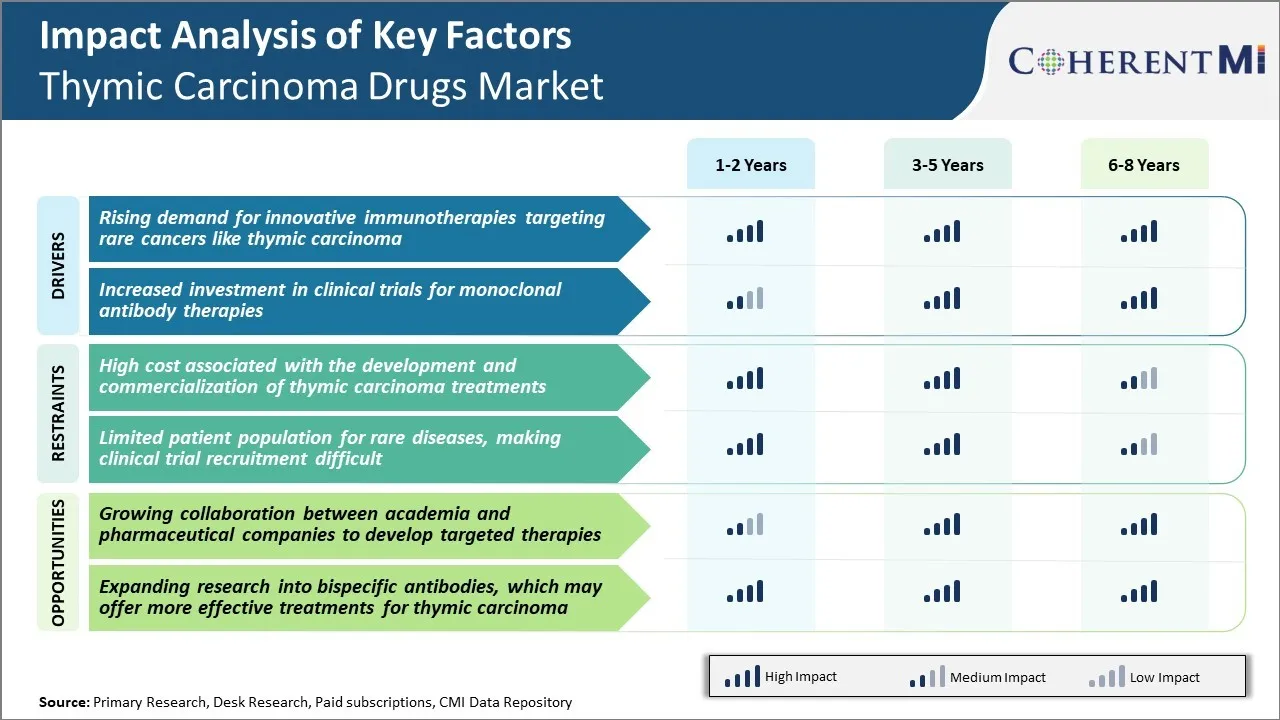ヒミック・カルチノーマ 医薬品市場 規模およびシェア分析 - 成長トレンドおよび予測 (2024 - 2031)
ヒミック・カルチノーマ 医薬品市場は、管理(経口、静脈内、皮下)の経路によってセグメント化され、 モレキュレ型(モノクローナル抗体、小分子、ペプチド)、地理(北米、中南米、アジア太平洋、欧州、中東、アフリカ) 上記セグメントの数値(USD百万米ドル)を提供しています。....
ヒミック・カルチノーマ 医薬品市場 トレンド
マーケットドライバー - Thymic Carcinomaのようなまれな癌をターゲティングする革新的な免疫療法のための上昇の要求
近年では、腫瘍学研究領域内での関心が高まっていますが、チムカルチノーマのようなまれで少ない一般的ながんタイプの革新的な治療を開発しています。 いくつかの新しい研究は、特に甲状腺癌腫瘍の分子プロファイルに合わせ、抗腫瘍免疫反応を募集、活性化および維持するのに役立ちます薬を評価することを発表しました。
PD-1やCTLA-4などの分子を標的するチェックポイント阻害剤は、初期臨床試験結果が従来の化学療法と比較して応答速度と応答の耐久性を奨励しているとして、いくつかの最適化を生成しました。 しかしながら、患者集団内の異質性や、プライマリや買収抵抗などの制限を与えられたこれらの療法を最適化するために、さらなる研究はまだ必要です。
チェックポイントモジュレータのほかに、チメリック抗原受容体(CAR)などの他の免疫治療薬を評価している実質的な研究があります。 T-cell療法、がんワクチン、およびシトカイン治療は、チムカルシンマに対する。 初期段階の臨床試験は、免疫細胞を腫瘍に増大させ、免疫細胞を刺激し、がん抗原を良く認識したり、免疫効果細胞を活性化させることができる新規薬候補を特徴付けています。
全体的には、免疫力学の根本的な甲状腺腫のさらなる理解と免疫療法によって革命的になった他の癌のニッチからの洞察を活用することで、臨床コミュニティ内で最適化されています。
市場ドライバー - モノクローナル抗体治療のための臨床試験への投資の増加
モノクローナル抗体は、近年のがん薬の重要なクラスとして出現し、様々ながんの抗体が承認されています。 がん細胞に対する免疫反応を高めたり、腫瘍細胞を直接殺したりすることで、腫瘍の成長を促すようなシグナル伝達経路をブロックしたりするような、異なるメカニズムで行動する能力は、それらに貴重な治療ツールになります。
胸部がんの場合、化学療法をはるかに超える限られた標準治療オプションがあります。 しかしながら, 有望な非臨床研究は、いくつかのターゲタブル信号経路と腫瘍抗原を識別しました 血漿細胞で表現. これにより、製薬会社やバイオテクノロジーが、この希少がん適応症に対する臨床試験における様々なモノクローナル抗体を積極的に評価できるようになりました。
進行中の研究のいくつかは、EGFR、HER2、VEGFなどの血漿癌で異常に活性化することが知られている抗体ブロック経路を評価しています。 企業は、ムリンと人間化されたモノクローナル抗体とモノセラピスだけでなく、化学療法のバックボーンと組み合わせて評価しています。 その他の臨床調査は、抗原薬をシト毒性のペイロードに特徴付けており、選択的に細胞キルティング剤を甲状腺癌細胞に届けることを目指しています。 初期のフェーズ試験では、抗体ドラッグコンジュゲイトやバイスペクトラム癌に対する免疫反応を高めるための抗体を探索しています。

市場課題 - TMdict _ TMdict
甲状腺癌薬市場で動作する企業が直面する主要な課題の1つは、この希少がんの治療の開発と商品化に関連した高いコストです。 新規医薬品の開発は、長年にわたって研究や臨床試験に大きな投資を必要としています。 発熱性カルチノーマは、非常に低い優先順位を持っているので、臨床試験のための患者プールは小さいです。 これにより、試用募集が長く高価なプロセスになります。
また、低容量のため、製品販売だけで開発コストを回復することが困難である場合があります。 小さなターゲット人口で、薬の価格は投資に適したリターンを得るために非常に高い必要があります。 しかし、高薬費は、患者様にとって手頃な価格とアクセスを抑えることができます。
全体的に、小さな市場規模と低リターンによる限られた商業インセンティブは、30代のカルチノーマセグメントに投資するための製薬会社に重要な課題をポーズします。 これは、企業がより有利な治療分野に焦点を当てているので、新しい薬の発売のための決定者として機能します。
市場機会 - アカデミアと製薬会社の間で成長し、ターゲット療法を開発する
甲状腺癌薬市場における潜在的な機会は、学術研究機関と製薬会社間の成長のコラボレーションです。 技術的および商業的課題を提示するチムカルチノーマのようなまれな癌では、クロス・インダストリー・パートナーシップは、知識共有とリソースの最大化の鍵です。
アカデミックグループは、臨床的専門知識を持ち、患者データ、組織、および生物学的サンプルへのアクセスを可能にし、病気の生物学を理解し、潜在的な薬物標的を特定することができます。 一方、製薬会社は、医薬品開発のための資金調達、規制知識、能力を提供します。
近年、学術研究者や製薬会社が、標的識別から臨床検証までの医薬品開発プロセスのさまざまな段階に一緒に取り組む共同プロジェクトが増加しています。 そのようなアライアンスは、新しい治療のベンチ・ツー・ベッドサイドの旅を高速追跡することを目指しています。
成功すると、ターゲットを絞ったセラピスの起動を加速し、thymicカルチノーマを治療するために利用可能なオプションを拡大し、患者に利益をもたらし、この市場で成長を後押しすることができます。